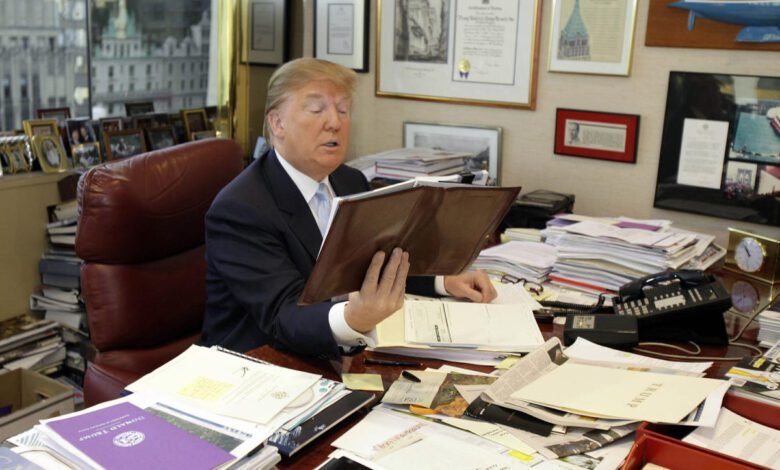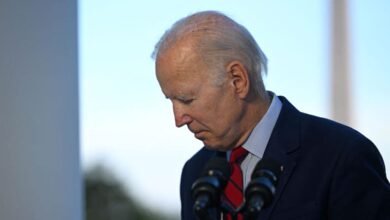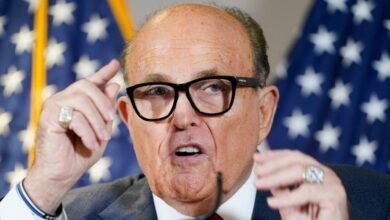The trial of silence revealed, once again, how poorly Trump’s businesses were managed

The wood-paneled boardroom featured at the end of “The Apprentice” episodes helped refine the image of Donald Trump as a powerful businessman who launched his political career.
But last month, in a wood-paneled courtroom, the sad reality behind that image was revealed again.
Witnesses at Trump’s Manhattan trial testified under oath that Trump cheated on his wife with a porn star and a Playboy model, tried to cover up these and other indiscretions by paying people off, and then reimbursed his lawyer for the sum of the payoffs claiming they were legal payments.
Trump has denied all of this and a jury will decide next week whether he is guilty of the charges.
But in giving this testimony, the witnesses also gave valuable information about the mismanagement of the Trump Organization. In a revealing conversation, the defense lawyers even sought to highlight part of the mismanagement.
Trump’s former fixer michael cohen was on the stand describing his various efforts on behalf of Trump. In an attempt to undermine Cohen’s credibility with the jury, Trump lawyer Todd Blanche asked Cohen about an attempt to rig online polls for Trump. Cohen said he initially agreed to pay $50,000 to a company called RedFinch Solutions, but later reduced it to just $20,000. But when he was reimbursed, he asked for the full $50,000.
In the end, he testified that he received more than double that amount because of a practice of “grossing” – increasing the payment to cover income taxes.
Blanche asked if Cohen “stole from the Trump Organization,” and Cohen admitted without hesitation that he did. Trump’s allies sought to portray this moment as a damaging one for the prosecution and it was certainly not helpful to Cohen’s credibility as a witness. Trump’s son, Eric, rejoiced at the admission on social media, saying the trial “just got interesting.”
But the younger Trump, executive vice president of the Trump Organization, should be a little more interested in how Cohen managed to get away with it.
Many Americans have been reimbursed by their boss at some point, whether it’s for buying a cake for an office birthday party or going out of town for a conference. If so, you know the first rule: keep the receipt. Often you have to scan it, load it into some complicated software program, and fill out several fields to explain how you paid for it, what it was for, and why it was necessary for the business.
Somehow, Cohen was reimbursed five times more than he spent – a total of $100,000. Again, to scam some online surveys.
It gets weirder.
In a 2019 Wall Street Journal article that first reported the payment, RedFinch Solutions owner John Gauger said he met Cohen at his Trump Tower office to collect the payment and received “a blue Walmart bag containing between $12,000 and $13,000 in cash and, at random, a boxing glove that Mr. Cohen said was used by a Brazilian mixed martial arts fighter.” (Cohen denied that description at the time, saying Gauger was paid by check.)
The Wall Street Journal also reported that the refund was made solely based on a handwritten note from Cohen. Turns out he didn’t keep the receipt.
This was just the latest report to undermine Trump’s long-vaunted business acumen. Earlier this year, a New York judge ordered Trump to pay $355 million in fines plus interest (with an obligation that was later reduced to $175 million) after finding that the Trump Organization had defrauded banks and insurance companies by exaggerate your wealth in financial statements. In a scathing 92-page opinion, the judge wrote: “The frauds here jump off the page.”
As a result of that case, Allen Weisselberg, former chief financial officer of the Trump Organization, pleaded guilty to two counts of perjury after already serving 100 days in prison for avoiding taxes on $1.7 million in corporate benefits. During the case, a court-appointed independent monitor also concluded that the company needed to change its procedures and update its financial statements, noting that despite cooperating, the organization still regularly provided documents “that lacked completeness and timeliness.”
Much of this can be attributed to the fact that the Trump Organization is a private conglomerate. Because they are not listed on stock exchanges, private companies do not have to meet the strict disclosure requirements of the Securities and Exchange Commission. Still, few of the more than 25 million private companies in the US are managed as carelessly as these various stories show.
And that meeting room? What was shown on TV was a set, built by the “The Apprentice” team to be easier to film.
In a 2018 documentary, show producer Bill Pruitt said the real meeting room in Trump Tower was much less impressive. “If you walked through Trump’s office in Trump Tower, you would see the splintered wood, and what is that smell?” he said in the film. “It wasn’t the empire we would have to sell to people. We needed to improve a little. And we did.
Whatever it achieves, the hush money trial has once again pulled back the curtain to reveal the real boardroom, and it’s not a pretty sight.
CORRECTION (May 25, 2024, 1:56 pm ET): A previous version of this article incorrectly stated how much the Trump Organization owes in civil fraud penalties. It owes $355 million plus interest, not $175 million.
This article originally appeared on MSNBC.com




